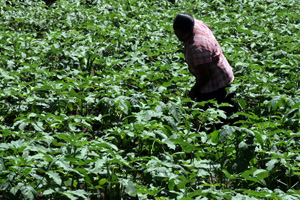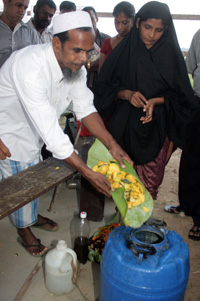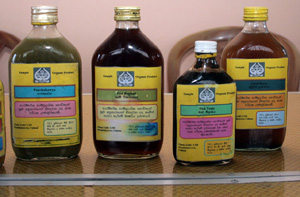Ampara -- Three kilos of papaya, three kilos of banana, three kilos of pumpkin, two eggs, three kilos jaggery and 10 litres of water.
This is no recipe for a fruit salad but the ingredients for a kind of organic fertilizer called ‘Effective Microbial Solution (EM) or Fruit Tonic which is applied to the soil to change the composition and nourish the soil.

Vegetable plot using organic fertiliser. |
Ampara is primarily an agricultural district and the farmers in this district produce 20% of the country’s rice needs.
Farmers here are close to obtaining accredited certification to market their range of organic fertilizers, to penetrate into the multi-million rupee fertilizer business in Sri Lanka. Oxfam GB Sri Lanka, operating several humanitarian projects, is behind the Ampara farmers in financing and providing technical support with the approval of Sunil Kannangara, Government Agent, Ampara.
Ms Erangi R. Fernando, Programme Coordinator, Oxfam GB, Ampara told The Sunday Times FT in Ampara that the Ampara farmers have developed several varieties of organic fertilizers that have been applied and proved highly effective, merging fully with the environmentally. Sans chemicals, the crops cultivated with these fertilizers are healthier, apart from being economical and cost effective.
She said that the farmers have started manufacturing these fertilizers and they could be packaged and ready to be marketed, but they find a hitch in marketing as there is no proper accredited certification to assure the genuineness and consistency of the products. They have tried all the avenues in Sri Lanka to obtain the necessary accreditation, but have failed. Ms Fernando said that they are now trying to get the necessary certification from the Coimbatore University in India.

Mixing |
Oxfam recently organized a 3-day field visit to Ampara to meet the farmers who produced these organic fertilizer, applied them in their fields and proved their success.
In Sri Lanka, the biggest challenge for food security is the low productivity. To help address this problem, Oxfam has implemented an innovative project, which is helping to increase household income for farmers while also increasing food security.
This project, which has been implemented in 18 villages in the district of Ampara, promoted the adoption of Diversified Alternative Farming Technology (DAFT).
Several organic-styled farming techniques are promoted through DAFT. The methods adopted showed a noticeable improvement in soil quality. “Before the soil lacked nutrients, richness, moisture and was hardly fertile. But, with this method cost is reduced by 60% and the yield has increased by 10%,” Ms Fernando said.
One hundred and sixty-eight ‘Self Help Groups’ were formed by small scale paddy producers, home gardeners, goat breeders and women headed income generating groups in Ampara.
Using organic techniques on less than one acre, farmers have seen their profits increase by 128%, and the cost of inputs fall by 14%, when compared to conventional farming methods. use of high quality seed paddy has prompted small-scale farmers to take on seed paddy production. According to K. Gopalan, Oxfam's Programme Manager, Ampara, farmers have reported a decrease in the quantity of seed required and a 500kg average increase in yield per acre cultivated. This represents an 85% increase in income per acre per cultivation cycle.
Another important observation from the field is that women have been the primary beneficiaries of this programme. In fact, to date, of the 1,660 village farmers who have been educated on DAFT, 1,160 are women.
Mr. Kannangara, said that the current fertilizer subsidy costs the national budget Rs. 30 million annually. DAFT could be a saving on the national budget if this method is adopted by farmers, he said. The programme in Amapara commenced on April 30 afternoon with three Ampara farmers sharing their success stories in the application of organic fertilizer.

Organic Fertilizer |
The participants visited several farms that use organic fertilizer and also witnessed how these organic fertilizers are manufactured.
On May 2, Nimal Dayaratnne, Deputy Director, Agricultural Extension, Ampara elaborated how the total scheme worked, followed by visits to several other farms. In the afternoon the participants visited Thambatta.
The Sunday Times FT met several farmers whose farms have shown great success in the application of the orgnic fertilizer. A.A.M. Jayasekera who has a 1-acre vegetable farm said that earlier they were using chemical fertilizer but switched three years to using organic fertilizer.
In the first few seasons they incurred losses but production began picking up. Mr Jayasekera said that within three months their income was Rs 80,000 while total expenditure was Rs 30,000, showing a profit of Rs 50,000.
These farmers have been given a thorough knowledge of how to make compost, and worm compost, Starter Solution, Horn fertilizer (using a cattle horn as the container), Fish Tonic, Coconut Tonic, Fruit Tonic (Effective Microbial Solution (EM)). Combined Plant Protection and Insect repellent Solution.
The ingredients for these different fertilizer are mostly locally available like ‘spoilt’ milk, coconut, fish waste, cattle urine, jaggary, cow dung, toddy etc. Farmers in Ampara are gradually picking up these alternate methods of farming with using organic fertilizer.
Ms Fernando said that the project commenced in January 2006 and ended in April 2009.
The total cost of the project is Sterling Pounds 231million and the project included Water Infrastructure Development, Diversifying Agricultural Alternative Farming Technology, etc.
A group of about 35 from Hambantota also participated in the 3-day programme and they mostly consisted of government officials led by W A Dharmasiri, Additional Government Agent, Hambantota. There were about six farmers from Hambantota in this group.
|



